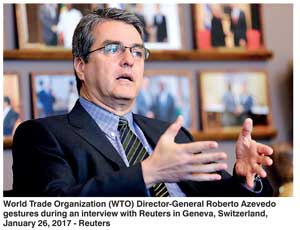Wednesday Feb 25, 2026
Wednesday Feb 25, 2026
Monday, 30 January 2017 01:10 - - {{hitsCtrl.values.hits}}
 Reuters: A trade accord that will boost global exports by $1 trillion should come into force within two weeks, the head of the World Trade Organization said on Thursday, just as the rhetoric of US President Donald Trump clouds the outlook for global trade.
Reuters: A trade accord that will boost global exports by $1 trillion should come into force within two weeks, the head of the World Trade Organization said on Thursday, just as the rhetoric of US President Donald Trump clouds the outlook for global trade.
The Trade Facilitation Agreement (TFA) will have a major impact on poorer countries, because it standardises and simplifies customs procedures, slashing the time, cost and complexity of taking goods over borders.
“In the WTO’s history, it is the biggest agreement we ever reached,” WTO Director-General Roberto Azevedo told Reuters in an interview.
Jordan, Chad and Kuwait are all poised to ratify, which would tip the agreement over the required mark of 110 WTO members to take effect, Azevedo said.
“There are estimates that once fully implemented, this could have an impact of around 2.7 percentage points on trade expansion throughout the world every year until say 2030, and half a percentage point of GDP growth around the world.”
Where a product may previously have taken 6-7 weeks to arrive, the waiting time should be cut to a few days.
“Things are going to cross the border much more easily, much more transparently and at lower costs,” Azevedo said.
“If it’s truly implemented and done well, there will be almost no contact between the client and the (customs) authority,” Azevedo said. “When that happens the room for corruption basically disappears. And we know that at the border, corruption is a problem for many countries.”
The United States, European Union, China and Japan were among the early adopters, although big and rich countries have less to gain since their customs procedures are already at high levels.
Asked if the deal was the high point of global trade liberalisation, the veteran Brazilian trade negotiator said there was still a “rich agenda” of potential trade reforms, including for investment, services and small business.
Azevedo said it was too early to tell whether the new US administration would be on board with those reforms, adding that much of what was being said about Trump’s plans for trade was speculation inferred from his previous comments.
Trump has advocated an “America first” stance, and talked of introducing border taxes to stop manufacturing jobs going to Mexico or China, prompting fears of a trade war between major economic blocs.
Very bad scenario
Azevedo said there could be an increase in trade disputes, and the WTO was ready to handle them.
“A lot of concerns I’ve heard in recent political debates in the United States can be addressed by tools that we have here in the WTO.”
But a trade war that involved ignoring the rules-based system would be a “very bad scenario”.
The outlook for world trade growth was hard to foresee because of conflicting signals, Azevedo said, with some people worried about a trade war and others anticipating an accelerating US economy and improving business environment.
The WTO is also an important arena for Britain’s discussions about its exit from the European Union, because the EU looks after Britain’s rights and obligations as a trading entity at the WTO. Britain must disentangle itself so it can negotiate as a separate entity at the WTO.
“I suppose, from what I hear, that it is going to take a couple of years, at least. At that point in time they will begin to negotiate with WTO members,” Azevedo said.
Asked if that might interfere with Britain’s plan to leave the EU in two years, he said: “Timing is not in my hands. It’s in members’ hands – and the political decision to initiate things.”
Britain could start to negotiate with WTO members sooner, Azevedo said, but he had not heard of such negotiations and he had not been approached to facilitate anything.